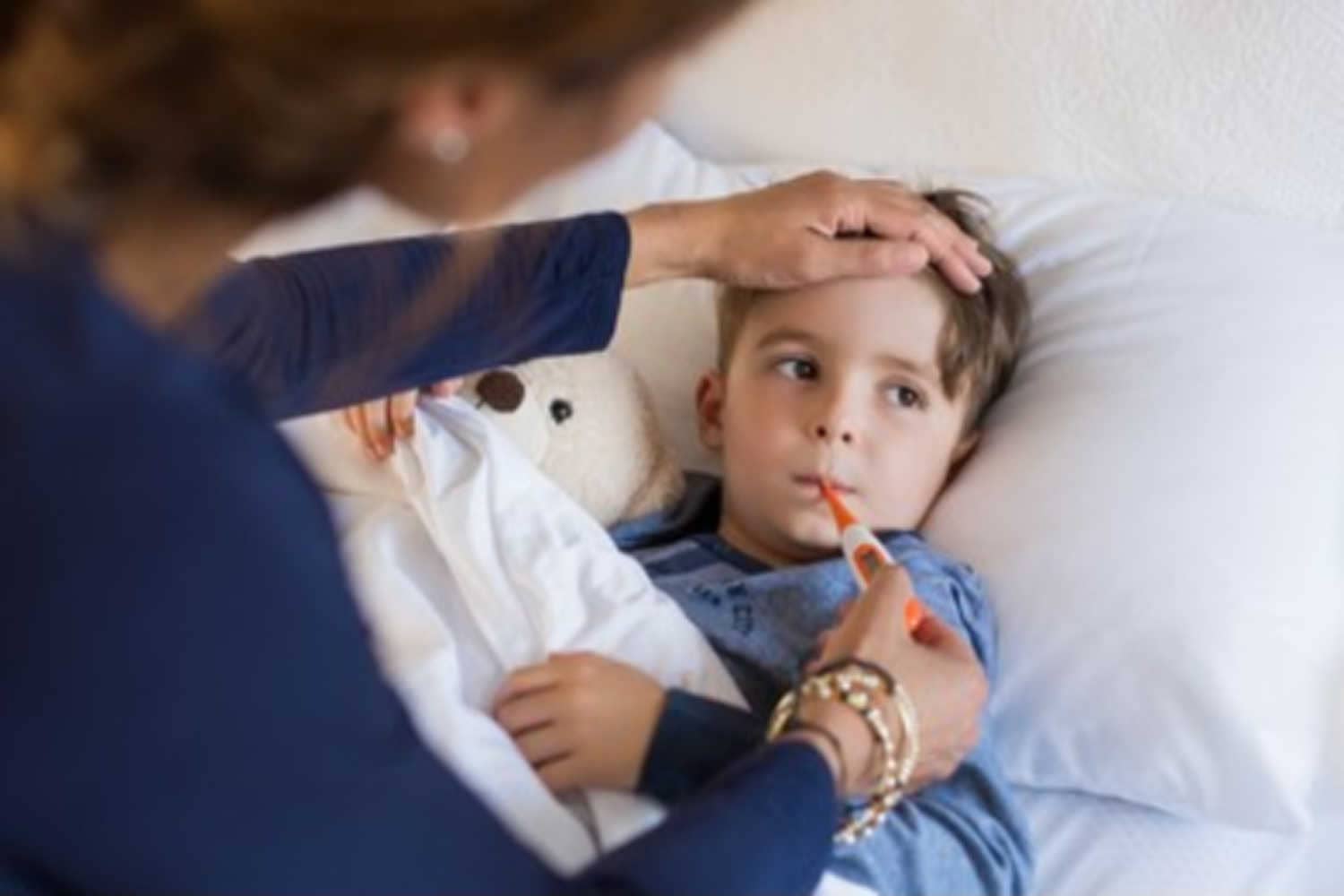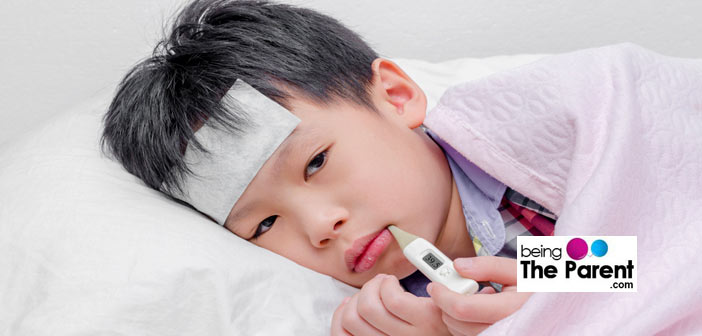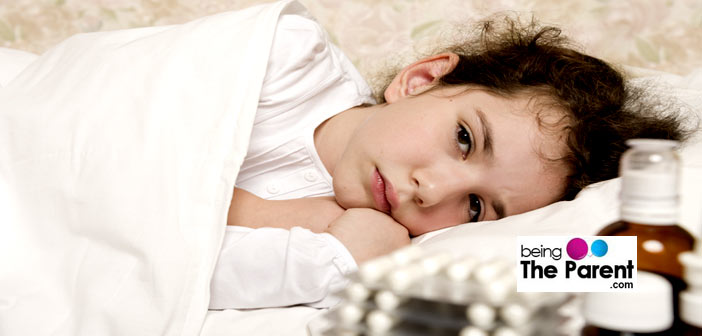 Whilst most of us are rejoicing in the relief from heat waves, the new mothers probably need to be more diligent. The onset of monsoon signifies change in climatic conditions. Put simply, more humidity = more germs! The wet verandah, never-drying nappies, appearance of mold, multiplication of deadly mosquitoes, etc., may all create an unhygienic environment conducive to promoting illnesses. The viral fevers are very common during the period. Due to the underdeveloped immune system, babies and young children are more susceptible to catching viral infections such as cold and flu.
Whilst most of us are rejoicing in the relief from heat waves, the new mothers probably need to be more diligent. The onset of monsoon signifies change in climatic conditions. Put simply, more humidity = more germs! The wet verandah, never-drying nappies, appearance of mold, multiplication of deadly mosquitoes, etc., may all create an unhygienic environment conducive to promoting illnesses. The viral fevers are very common during the period. Due to the underdeveloped immune system, babies and young children are more susceptible to catching viral infections such as cold and flu.
- What Is Viral Fever?
- Does My Baby Have Viral Fever?
- Viral Fever Symptoms That Call For Emergencies
- Protecting Your Child From Viral Infections
- Viral Infection Treatment In Children
- How Long Does Viral Fever Last?
What Is Viral Fever?
Fever in itself seems to be one of the most common conditions in babies and young kids, causing lots of anxiety in parents. Though fever is our body’s natural reaction to fight off an infection, yet it needs to be understood that it should not be taken lightly. As evident from the name itself, viral fever denotes a condition that is contagious, i.e., transmitted from one person to another. If a person carrying the virus sneezes, coughs or comes in the vicinity of the healthy person, he is capable of passing on the virus to him. This is because these viruses can be transmitted through the air and touch as well. Children and babies are prone to getting viral infections, as their immune system is not very strong. On entering the body, the immune system is activated and in an attempt to get rid of the foreign particles in the body, the temperature of the body is increased.
Does My Baby Have Viral Fever?
Since fever is quite a common condition, especially during the change of seasons, you must check your child if he is having chills, or his body pains a lot. Below are few other symptoms to help you identify if your child has viral fever:
- A high fever, usually above 100.4 (ranges between 100.4 and 103°F)
- Fever is recurrent and doesn’t go away with medicines
- Shivering, chills and a sore throat
- Diarrhea
- Fatigue
- Skin rash, a runny nose or congestion
Viruses cannot be killed by antibiotics. The viral fevers usually settle down in three days. If left untreated, it may jeopardize the life of the baby.

Viral Fever Symptoms That Call For Emergencies
A fever above 100.4°F in babies below 3 months is a medical emergency. The underdeveloped immune system may not cope with the viral attack. It’s futile to wait for the above mentioned symptoms show because the fact is very young babies may not show these symptoms. The viral infections are less alarming than bacterial infections. But it is very difficult to distinguish between viral and bacterial fevers. So it’s better to consult a physician rather than self-medicating or buying OTC medicines.
Other signs which denote medical emergencies in babies during viral fever:
- Fatigue
- Unresponsiveness
- Difficulty breathing
- Convulsions
- Swollen feet and swollen face
- Vomiting and loss of appetite
- Redness in eyes
- Diarrhea persists for over two weeks
- Coughing persists for over three weeks
It’s best to make an appointment with the pediatrician if the fever exceeds 101°F. It is quite likely that your doctor will perform a blood test. Nothing to panic, it’s required to identify the pathogen and suitable treatment.
Protecting Your Child From Viral Infections
Flu is generally common in toddlers and children. When a season is giving way to another, make sure that you boost your child’s immunity by giving him flu shots. Flu shots can be administered in young babies and toddlers till 2 years of age. Below are a few steps to keep your child safe from contracting viral infections:
- If a family member is suffering from flu, instruct him/her to maintain distance from the baby as he is very susceptible to catching such infections
- Wash baby’s clothes separately
- Sterilize the baby’s utensils, if any
- Encourage washing of hands as often as possible and follow good hygiene habits
- Use natural remedies to ward off the pesky mosquitoes, which may cause complications such as dengue and malaria

Viral Infection Treatment In Children
Most physicians recommend managing the symptoms rather than concentrating on the temperature.
- Stick to the traditional method of bringing down the fever using a wet sponge. Simply dip a clean sponge or muslin cloth in lukewarm water (between 85-90°F) and put it on the baby’s forehead and underarms. Repeat this a couple of times during the day
- Provide plenty of warm fluids such as water and soup will soothe the sore throat and cough. It also provides energy and nutrients to the weak baby
- Provide ORS to combat dehydration
- Practice hygiene. Use a hand-sanitizer while handling the baby. Make sure others follow suit
- Use a vaporizer to take care of the congested nose and ease breathing. Tip: Add a small teaspoon of Vicks VapoRub to the water in vaporizer
- Rub some Vaseline on the nose of the baby to avoid the peeling of skin cause by frequent wiping of nose
- Allow your baby to rest. It’s a bit sad to see your baby’s toys lying idle around, but at this time your baby sure does needs plenty of rest
If you are breastfeeding the baby, then do not stop. Breast milk provides essential nutrients to the baby and helps fight infections.
How Long Does Viral Fever Last?
Most viral fevers in kids last through 3 to 4 days. However, some exceptions are fevers from influenza or mononucleosis, which can take about 10 days time to go. You must make a note of the number of days a fever lasts in your child, as it helps the doctors in ascertaining the virus and providing better treatment. Many parents observe that fever rises towards the end of the day, though it looks normal during the rest of day. This is a common characteristic of viral fever and is quite normal.
Administer the medicines regularly to the baby and in recommended doses. If you notice anything unusual, immediately take your baby to the doctor. Do not increase or reduce the medicine dosage on your own. Finally, remember not to panic, your baby can sense your anxiety which can cause further discomfort. Stay calm and careful!

